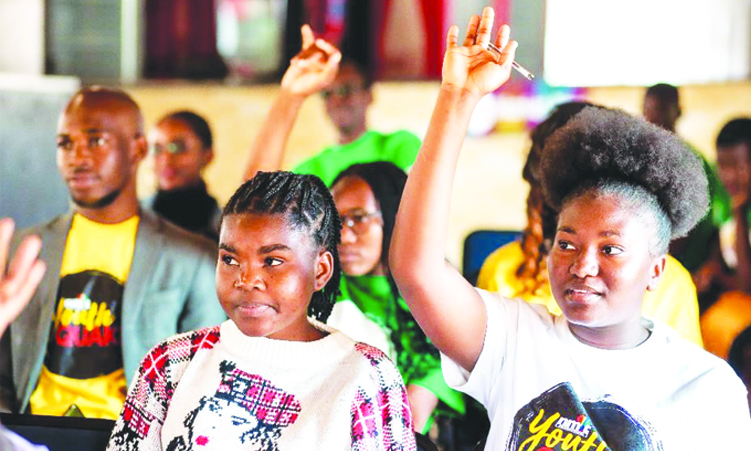The Oshana Regional Council says financial, structural and systemic challenges are keeping the region’s youth from economic participation and employment, leading it to announce a N$118.1 million allocation to youth-centred initiatives.
This comes after a recent report by the National Council flagged limited access to funding and business opportunities as the stumbling blocks for struggling youth empowerment projects in Namibia.
The report was tabled by the chairperson of the standing committee on education, science, information and comunication technology and youth development, Olivia Hanghuwo, following visits to youth projects in the Erongo, Kunene, Omusati, Oshana, Ohangwena and Otjozondjupa regions in September 2024.
Oshana Regional Council chief regional officer Teopolina Hamutumua says most of the challenges are financial, structural and systemic in nature.
“Addressing them requires multi-sectoral coordination, decentralised resources, youth inclusion of planning and stronger links between education, innovation and local economic development,” Hamutumua yesterday said.
YOUTH FOCUS
She said the town council will be running a series of targeted interventions aimed at uplifting the region’s youth through inclusive local economic development (LED), enterprise support and employment creation.
These interventions, outlined in the council’s Local Economic Development Strategy (2025–2030) and Internal Procurement Policy, aim to unlock the full potential of Namibia’s youth; a demographic that constitutes over 35% of the region’s population.
Oshana’s unemployment rate for youth (between 15 and 24 years old) stands at 66.2% for males and 62.9% for females.
The council has committed N$118.1 million to these interventions as part of its annual procurement plan, of which 15% is reserved for micro, small and medium enterprises owned by youth.
The allocation, Hamutumua said, is intended to stimulate youth entrepreneurship and enable their full participation in public procurement and service delivery.
To ensure youth are adequately prepared to seize these opportunities, the council will provide capacity-building programmes and technical training on the public bidding process, including proposal writing, compliance with procurement standards and cost estimation.
Through mentorship and training sessions, young entrepreneurs will be equipped to compete fairly and successfully for government contracts.
MEETING LOCAL NEEDS
The council has further submitted a request for procurement exemptions to allow youth-led businesses and cooperatives to supply bricks and construct rural toilets as part of sanitation initiatives valued at N$1.4 million.
This intervention will not only provide essential services to communities but also serve as a platform for skills transfer and job creation among local youth, Hamutumua said.
In addition, the town council is actively integrating interns and casual youth labourers into its ongoing Food Security Programme, particularly in land preparation, horticulture and livestock production.
“These engagements are aimed at reducing the high youth unemployment rate, currently at 49.4%, by providing practical experience and entry points into the labour market,” the chief regional officer said.
To further institutionalise support for youth enterprise, the council has committed to establishing business incubation centres across the region.
These centres will offer technical training in fields such as welding, culinary arts, tailoring and carpentry, equipping young people with marketable skills that align with both regional priorities and local demand.
Each constituency has been tasked to register youth cooperatives and informal businesses for mentorship, incubation and potential inclusion in regional development projects.
Hamutumua urged the youth to take full advantage of these initiatives by registering with their constituency offices, applying for training and participating in procurement opportunities.
PAST HURDLES
The region’s youth entrepreneurial endeavours have faced challenges, including the Oshakati East Best Youth Trading brick manufacturing business, which was initiated in 2018 but only commenced operations in September 2023.
According to the standing committee’s report, the business received machinery valued at N$260 000 including concrete mixers, spades, wheelbarrows and a delivery truck, with N$60 000 allocated to operational capital.
“The business currently produces approximately 2 500 bricks weekly and 500 per day. It has three permanent employees, who are bricklayers. The business faces significant transport challenges due to a truck breakdown, forcing the beneficiary to rent a truck for business operations, particularly the transportation of water and sand,” the report stated.
The youth projects visited by the standing committee are funded through the 121 Constituency Youth Enterprise initiative and the Namibia Youth Credit Scheme.
The primary goal of the initiative is to create sustainable, youth-led enterprises that can contribute to economic growth and job creation, particularly in rural areas.
About 60 out of the 121 business plans were ready for financing, with the remaining plans expected to be completed.
The Development Bank of Namibia allocated N$1 million for the training phase and an additional N$8 million in soft loans to fund 28 youth entrepreneurs across the 14 regions.
The programme aims to create at least 1 210 permanent jobs, with the potential to generate further employment opportunities as the enterprises grow.
Hanghuwo said there is a need for stronger monitoring and evaluation to ensure programmes effectively address youth needs and adapt to changing economic conditions.
Stay informed with The Namibian – your source for credible journalism. Get in-depth reporting and opinions for
only N$85 a month. Invest in journalism, invest in democracy –
Subscribe Now!











